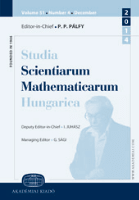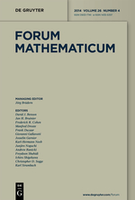
STUDIA SCIENTIARUM MATHEMATICARUM HUNGARICA
Scope & Guideline
Pioneering Insights for Tomorrow's Mathematicians
Introduction
Aims and Scopes
- Graph Theory and Combinatorics:
The journal publishes research on various aspects of graph theory, including extremal graph theory, coloring problems, and Ramsey theory, contributing to the understanding and application of combinatorial structures. - Geometry and Topology:
Papers often explore geometric properties, including convexity, polytopes, and surfaces, revealing deep connections between geometry and other mathematical fields. - Algebra and Number Theory:
The journal includes studies on algebraic structures, ideals, and number-theoretic problems, addressing foundational issues and new conjectures in these areas. - Differential Equations and Mathematical Analysis:
Research articles delve into solutions and properties of differential equations, particularly in fractional and nonlinear contexts, showcasing the analytical techniques employed in modern mathematics. - Mathematical Logic and Foundations:
The journal also covers topics in mathematical logic, providing insights into the foundational aspects of mathematics and their implications in various fields.
Trending and Emerging
- Interdisciplinary Applications of Mathematics:
There is a growing trend towards applying mathematical theories and techniques to other fields, such as physics and computer science, which enhances the relevance and applicability of mathematical research. - Complex Structures and Algebraic Geometry:
Recent articles have begun to focus on complex structures and their properties, indicating a heightened interest in algebraic geometry and its connections to other mathematical domains. - Computational and Algorithmic Approaches:
An increase in research employing computational methods and algorithms signifies a shift towards practical problem-solving in mathematics, appealing to a broader audience and addressing real-world challenges.
Declining or Waning
- Classical Analysis:
Papers focusing on classical analysis techniques and topics have become less frequent, suggesting a potential shift towards more modern and applied mathematical approaches. - Elementary Number Theory:
Research in elementary number theory, particularly in foundational problems and techniques, has diminished, possibly reflecting a broader interest in computational or algebraic aspects instead. - Traditional Geometric Problems:
Some classical geometric problems that were once popular in the journal's publications have seen a decrease, indicating a movement towards more abstract or higher-dimensional geometric studies.
Similar Journals

European Journal of Mathematics
Advancing Mathematical FrontiersWelcome to the European Journal of Mathematics, a prominent publication that serves as a vital platform for disseminating high-quality research in the field of mathematics. Published by Springer International Publishing AG, this journal has witnessed significant growth since its inception in 2015 and is recognized for its contributions within the Q2 category of Mathematics (miscellaneous) as per the 2023 rankings. With an ISSN of 2199-675X and an E-ISSN of 2199-6768, the journal aims to foster innovation and collaboration among researchers, professionals, and students alike. Although it operates under a traditional access model, the journal's commitment to advancing mathematical knowledge and applications cannot be overstated. Positioned among the top-tier publications, the European Journal of Mathematics is an essential resource that encourages the exploration of emerging trends and theories in mathematics, making it indispensable for anyone striving to stay at the forefront of this dynamic field.

Filomat
Elevating Research in Diverse Mathematical DisciplinesFilomat is a distinguished academic journal published by the University of Niš, Faculty of Science and Mathematics, located in Serbia. Operating since 2010, the journal has carved a niche within the field of mathematics, particularly in miscellaneous mathematics, as evidenced by its recognition in the Q3 quartile for 2023. With an ISSN of 0354-5180, Filomat provides a platform for both researchers and academics to share insights and advancements across diverse mathematical disciplines, enhancing collaboration and knowledge sharing. Although the journal currently does not offer open access, its contributions are critical for those engaging with complex mathematical concepts and applications. Furthermore, with a Scopus rank of #223 out of 399 in the realm of General Mathematics, it stands as a credible source for high-quality research. The journal's objective is to promote a deeper understanding and application of mathematical theories, making it a vital resource for students, professionals, and researchers alike.

FORUM MATHEMATICUM
Connecting Ideas: A Hub for Mathematical ExcellenceFORUM MATHEMATICUM, published by WALTER DE GRUYTER GMBH, is a distinguished academic journal based in Germany, known for its significant contributions to the field of mathematics. With an ISSN of 0933-7741 and an E-ISSN of 1435-5337, the journal features comprehensive studies ranging from applied mathematics to diverse mathematical disciplines. Having maintained a commendable presence since 1989, FORUM MATHEMATICUM has achieved notable classification rankings, including Q2 in Applied Mathematics and Q1 in miscellaneous Mathematics as of 2023. Additionally, it holds a Scopus rank within the top 60th percentile in General Mathematics, making it a prominent platform for researchers and professionals seeking rigorous analysis and innovative methodologies in mathematics. While the journal does not currently offer open access, its rich content is pivotal for advancing mathematical theory and applications, appealing to students and seasoned academics alike.

ANNALS OF MATHEMATICS
Fostering Groundbreaking Discoveries in MathematicsANNALS OF MATHEMATICS is a prestigious peer-reviewed journal published by the Department of Mathematics at Princeton University, dedicated to the advancement of mathematical research across diverse fields, including mathematics, statistics, and probability. With an impressive impact factor reflecting its critical role in the academic community, this journal is categorized within the Q1 quartile rankings for both Mathematics and Statistics in 2023, evidencing its high circulation of influential and often-cited publications. Researchers can access the latest findings and theoretical advancements in an environment that fosters intellectual discourse and innovation, although the journal does not currently offer open access. Spanning a remarkable convergence period from 1996 to 2024, the ANNALS OF MATHEMATICS serves as a vital resource for mathematicians, statisticians, and analysts striving to push the boundaries of knowledge and application in these critical fields.

Pure and Applied Mathematics Quarterly
Connecting Mathematicians Through Quality ResearchPure and Applied Mathematics Quarterly is a prestigious journal published by INT PRESS BOSTON, INC, focusing on the diverse and evolving field of mathematics. Since its inception in 2007, this journal has grown significantly, currently holding a Q1 ranking in the Mathematics (Miscellaneous) category for 2023, positioning it among the leading publications in the discipline. With a commitment to publishing high-quality research, Pure and Applied Mathematics Quarterly fosters innovation and dialogue within the mathematical community by providing a platform for theoretical advancements and practical applications. The journal remains accessible to researchers and professionals through its ISSN 1558-8599 and E-ISSN 1558-8602, although it does not currently offer open access. As a vital resource for mathematicians, educators, and students, this journal endeavors to expand the frontiers of mathematical knowledge and contribute to the academic dialogue surrounding this fundamental science.

Kyungpook Mathematical Journal
Pioneering Research for a Mathematical TomorrowWelcome to the Kyungpook Mathematical Journal, a prominent publication dedicated to the advancement of mathematical research across various fields, including applied mathematics and miscellaneous mathematical disciplines. Published by the Department of Mathematics at Kyungpook National University in South Korea, this journal aims to disseminate high-quality original articles, fostering a deeper understanding and innovative applications of mathematical theories. With a distinguished Scopus ranking in its category, standing at Q3 in Applied Mathematics and Q3 in Mathematics (miscellaneous), it serves as a crucial platform for both emerging and renowned scholars to share their findings with a global audience. This publication is indexed in reliable databases, ensuring enhanced visibility and impact for its contributors. Even though it currently lacks open-access distribution, the journal remains an essential resource for researchers, professionals, and students looking to stay at the forefront of mathematical exploration from 2007 to 2024 and beyond. Join us in contributing to the vibrant discourse that shapes the future of mathematics.

Forum of Mathematics Sigma
Fostering collaboration in the world of mathematics.Forum of Mathematics Sigma is a premier open access journal published by Cambridge University Press that has been at the forefront of mathematical research since its inception in 2013. With a strong emphasis on advancing the fields of mathematics, the journal consistently achieves Q1 rankings across multiple categories, including Algebra and Number Theory, Analysis, and Computational Mathematics. This distinction highlights its impact and relevance within the scholarly community. The journal prides itself on providing a platform for innovative research, fostering collaboration among researchers and practitioners across various mathematical disciplines. Open access publication ensures that cutting-edge findings are widely available to readers globally, enhancing the dissemination of knowledge. With an address in the heart of Cambridge, England, Forum of Mathematics Sigma is dedicated to promoting high-quality research and making significant contributions to the development of mathematics.

Miskolc Mathematical Notes
Empowering Scholars with Peer-Reviewed Mathematical KnowledgeMiskolc Mathematical Notes is a distinguished journal in the field of mathematics, published by the University of Miskolc Institute of Mathematics in Hungary. With a commitment to advancing research in areas such as Algebra and Number Theory, Analysis, Control and Optimization, Discrete Mathematics and Combinatorics, and Numerical Analysis, this journal provides a platform for both theoretical and applied contributions that enhance the understanding of complex mathematical concepts. Established in 2010, the journal has steadily gained a reputation, reflected in its 2023 categorization as a Q3 journal across several mathematical disciplines. While it operates under a traditional access model, researchers and mathematicians will find invaluable insights in its peer-reviewed articles. With Scopus rankings demonstrating respectable performance in various mathematical categories, Miskolc Mathematical Notes serves as an essential resource for scholars aiming to stay at the forefront of mathematical research and its applications.

CUBO-A Mathematical Journal
Championing Open Access in Mathematical InquiryCUBO-A Mathematical Journal, published by the Department of Mathematics and Statistics at Universidad de La Frontera in Chile, stands as a significant Open Access resource in the field of mathematics since its inception in 2011. With an ISSN of 0716-7776 and an E-ISSN of 0719-0646, this journal invites submissions that explore a wide spectrum of mathematical disciplines, including Algebra, Number Theory, Analysis, Geometry, Topology, and Logic. Although currently positioned in the Q4 category across various mathematical domains and registered at Rank #223/399 in General Mathematics in Scopus, CUBO serves as a valuable platform for emerging researchers and practitioners to disseminate their findings. Operating under a continuous commitment to accessibility, CUBO fosters an inclusive academic environment that supports the exchange of innovative ideas vital to advancing mathematics. The journal's target audience encompasses a diverse community of researchers, professionals, and students eager to participate in the expanding dialogue within mathematical sciences.

CANADIAN JOURNAL OF MATHEMATICS-JOURNAL CANADIEN DE MATHEMATIQUES
Connecting scholars through high-quality mathematical insights.Canadian Journal of Mathematics - Journal Canadien de Mathématiques is a prestigious peer-reviewed journal published by Cambridge University Press, which aims to advance the field of mathematics through the dissemination of high-quality research articles. With its ISSN 0008-414X and E-ISSN 1496-4279, the journal plays a pivotal role in fostering mathematical research and collaboration. It has been recognized for its impactful contributions, currently holding a category quartile ranking of Q2 in Mathematics (miscellaneous) for 2023 and sits in the 66th percentile among its peers according to Scopus rankings. As the journal continues its convergence from its inception in 1994 through to 2024, it remains a vital resource for researchers, professionals, and students seeking to stay at the forefront of mathematical developments. The journal does not operate under an open access model, allowing for a curated collection of articles that adhere to rigorous academic standards.